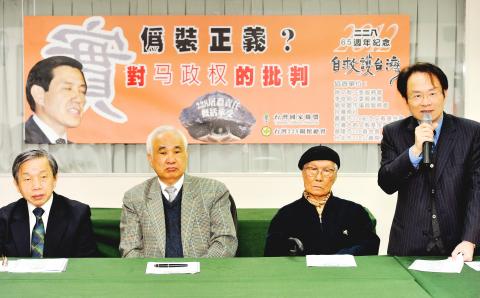President Ma Ying-jeou (馬英九) has failed to deliver on his pledge to find the truth about the 228 Massacre and its perpetrators, civic groups and victims’ families said yesterday.
Civic groups plan to highlight Ma’s disappointing record on transitional justice in his first term with two marches to commemorate the 65th anniversary of the massacre, group representatives told a press conference.
In a violent suppression of anti-government uprisings that began on Feb. 28, 1947 — two years after the end of Japanese colonial rule — Chinese Nationalist Party (KMT) troops killed between 18,000 and 30,000 people, the majority of them Taiwanese and including many of the island’s leaders and intellectuals.

Photo: Chien Rung-fong, Taipei Times
Ma said at the opening ceremony of the renovated National 228 Memorial Museum on Feb. 28 last year that the government would continue to unearth the truth of the incident to help future generations understand the historical facts of the massacre and to make sure such incidents never happen again, Taiwan 228 Care Association chairman Chang Yen-hsien (張炎憲) said.
However, Ma and his administration had failed to uncover any truths for the victims’ families in the past four years, he said.
Neither had anyone involved in the incident stepped forward to offer an apology to the victims and the public, he added.
This is why an alliance of civic groups has organized marches to raise awareness of the massacre and Ma’s negligence, Taiwan Nation Alliance convener Yao Chia-wen (姚嘉文) said.
The first march is scheduled for Taipei on Feb. 28 under the theme “self-salvation to protect Taiwan,” and it will also protest against Ma’s “pro-China” policies, which the group says are putting Taiwan’s sovereignty in jeopardy.
A second march is planned for Chiayi City on March 25.
More than 50 memorial services, most of which have been organized by Taiwan’s Presbyterian Church, and other events would be held nationwide to commemorate the massacre, the 228 Memorial Foundation said.
Ma is scheduled to attend a memorial ceremony organized by the central government, to be held at Taipei’s 228 Peace Park on the afternoon of Feb. 28.

A magnitude 4.9 earthquake struck off Tainan at 11:47am today, the Central Weather Administration (CWA) said. The hypocenter was 32.3km northeast of Tainan City Hall at a depth of 7.3km, CWA data showed. The intensity of the quake, which gauges the actual effect of a seismic event, measured 4 in Tainan and Chiayi County on Taiwan's seven-tier intensity scale, the data showed. The quake had an intensity of 3 in Chiayi City and County, and Yunlin County, while it was measured as 2 in Kaohsiung, Nantou County, Changhua County, Taitung County and offshore Penghu County, the data showed. There were no immediate reports of

‘DENIAL DEFENSE’: The US would increase its military presence with uncrewed ships, and submarines, while boosting defense in the Indo-Pacific, a Pete Hegseth memo said The US is reorienting its military strategy to focus primarily on deterring a potential Chinese invasion of Taiwan, a memo signed by US Secretary of Defense Pete Hegseth showed. The memo also called on Taiwan to increase its defense spending. The document, known as the “Interim National Defense Strategic Guidance,” was distributed this month and detailed the national defense plans of US President Donald Trump’s administration, an article in the Washington Post said on Saturday. It outlines how the US can prepare for a potential war with China and defend itself from threats in the “near abroad,” including Greenland and the Panama

The Chinese Nationalist Party (KMT) is maintaining close ties with Beijing, the Democratic Progressive Party (DPP) said yesterday, hours after a new round of Chinese military drills in the Taiwan Strait began. Political parties in a democracy have a responsibility to be loyal to the nation and defend its sovereignty, DPP spokesman Justin Wu (吳崢) told a news conference in Taipei. His comments came hours after Beijing announced via Chinese state media that the Chinese People’s Liberation Army’s Eastern Theater Command was holding large-scale drills simulating a multi-pronged attack on Taiwan. Contrary to the KMT’s claims that it is staunchly anti-communist, KMT Deputy

RESPONSE: The government would investigate incidents of Taiwanese entertainers in China promoting CCP propaganda online in contravention of the law, the source said Taiwanese entertainers living in China who are found to have contravened cross-strait regulations or collaborated with the Chinese Communist Party (CCP) could be subject to fines, a source said on Sunday. Several Taiwanese entertainers have posted on the social media platform Sina Weibo saying that Taiwan “must be returned” to China, and sharing news articles from Chinese state media. In response, the Mainland Affairs Council (MAC) has asked the Ministry of Culture to investigate whether the entertainers had contravened any laws, and asked for them to be questioned upon their return to Taiwan, an official familiar with the matter said. To curb repeated